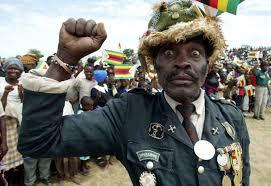News / National
Zimbabwe resumes war victims' compensation after 26 years
28 Sep 2024 at 11:12hrs |
3 Views

The Minister of Veterans of the Liberation Struggle Affairs, Monica Mavhunga, has announced the resumption of compensation payments for war victims, marking a major step in supporting Zimbabwe's liberation heroes and heroines. This announcement was made during her ministerial statement delivered in the Senate on Thursday.
The compensation scheme, which was suspended in 1997 amid allegations of corruption, abuse, and mismanagement, will now restart over two decades later, following significant efforts to reform and address long-standing grievances. Since Zimbabwe's independence, providing adequate support to war veterans, including compensation for injuries and losses sustained during the liberation struggle, has remained a challenge.
The War Victims' Compensation Fund was initially suspended after an investigation by the Chidyausiku Commission of Inquiry in 1998, which sought to address corruption concerns but led to the halting of payments.
Minister Mavhunga outlined several key initiatives aimed at improving the welfare of war veterans and their families, including safeguarding land allocated to them.
"Land allocated to war veterans and children of war veterans must not be taken away from them since it is their heritage, which they fought for and sacrificed their lives," Mavhunga emphasized. "We owe our veterans, not just our gratitude but tangible support and protection."
She further highlighted the government's commitment to ensuring veterans have access to the resources they fought for, with measures that will see a 20% quota on gazetted land, which aims to curb widespread evictions of veterans from farms and mines.
The resumption of compensation will also involve amending the War Victims Compensation Act to include individuals injured by landmines after the liberation war, addressing a previously overlooked group.
Additionally, Mavhunga revealed plans to register and provide state assistance to the dependents of fallen heroes, noting that many veterans and families of deceased liberation fighters are unaware of the benefits to which they are entitled.
"There is a need for a massive public awareness campaign to inform them of their benefits and register those eligible. The National Heroes Dependents Assistance Board is already conducting workshops across the country, with Mashonaland East, Matabeleland South, and Midlands provinces covered so far," the minister stated.
Once the registration process is complete, eligible dependents will receive payments as defined under the National Heroes Act.
To further assist war veterans, the ministry will establish technical committees to address challenges veterans face in accessing loans and resolving mining disputes, ensuring their economic security.
President Emmerson Mnangagwa has in recent months reiterated the importance of improving the welfare of liberation war fighters, calling for the inclusion of those left out in previous compensation vetting processes. The renewed efforts reflect the government's desire to finally provide long-overdue support to those who fought for Zimbabwe's independence.
The compensation scheme, which was suspended in 1997 amid allegations of corruption, abuse, and mismanagement, will now restart over two decades later, following significant efforts to reform and address long-standing grievances. Since Zimbabwe's independence, providing adequate support to war veterans, including compensation for injuries and losses sustained during the liberation struggle, has remained a challenge.
The War Victims' Compensation Fund was initially suspended after an investigation by the Chidyausiku Commission of Inquiry in 1998, which sought to address corruption concerns but led to the halting of payments.
Minister Mavhunga outlined several key initiatives aimed at improving the welfare of war veterans and their families, including safeguarding land allocated to them.
"Land allocated to war veterans and children of war veterans must not be taken away from them since it is their heritage, which they fought for and sacrificed their lives," Mavhunga emphasized. "We owe our veterans, not just our gratitude but tangible support and protection."
She further highlighted the government's commitment to ensuring veterans have access to the resources they fought for, with measures that will see a 20% quota on gazetted land, which aims to curb widespread evictions of veterans from farms and mines.
Additionally, Mavhunga revealed plans to register and provide state assistance to the dependents of fallen heroes, noting that many veterans and families of deceased liberation fighters are unaware of the benefits to which they are entitled.
"There is a need for a massive public awareness campaign to inform them of their benefits and register those eligible. The National Heroes Dependents Assistance Board is already conducting workshops across the country, with Mashonaland East, Matabeleland South, and Midlands provinces covered so far," the minister stated.
Once the registration process is complete, eligible dependents will receive payments as defined under the National Heroes Act.
To further assist war veterans, the ministry will establish technical committees to address challenges veterans face in accessing loans and resolving mining disputes, ensuring their economic security.
President Emmerson Mnangagwa has in recent months reiterated the importance of improving the welfare of liberation war fighters, calling for the inclusion of those left out in previous compensation vetting processes. The renewed efforts reflect the government's desire to finally provide long-overdue support to those who fought for Zimbabwe's independence.
Source - NewZimbabwe
Join the discussion
Loading comments…

























